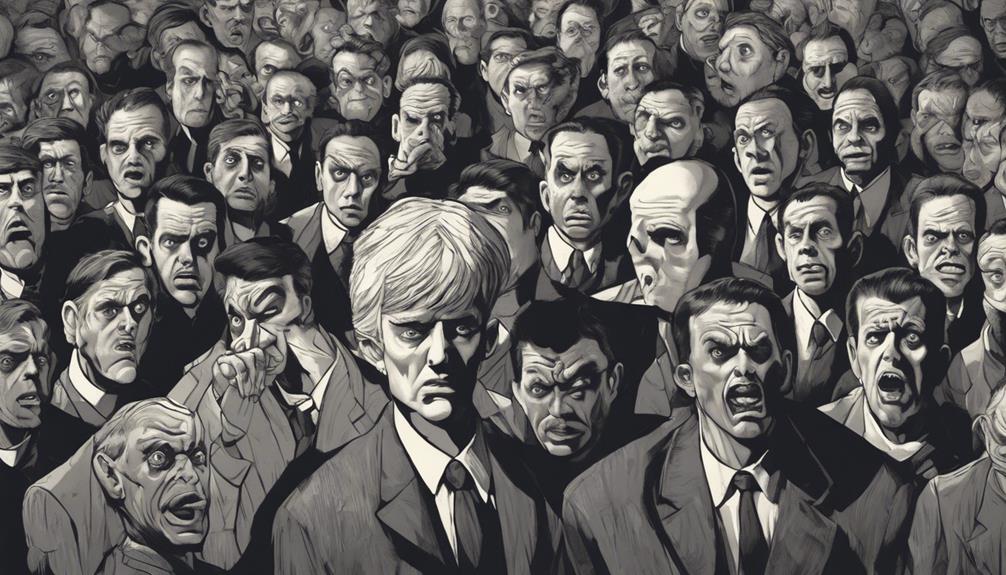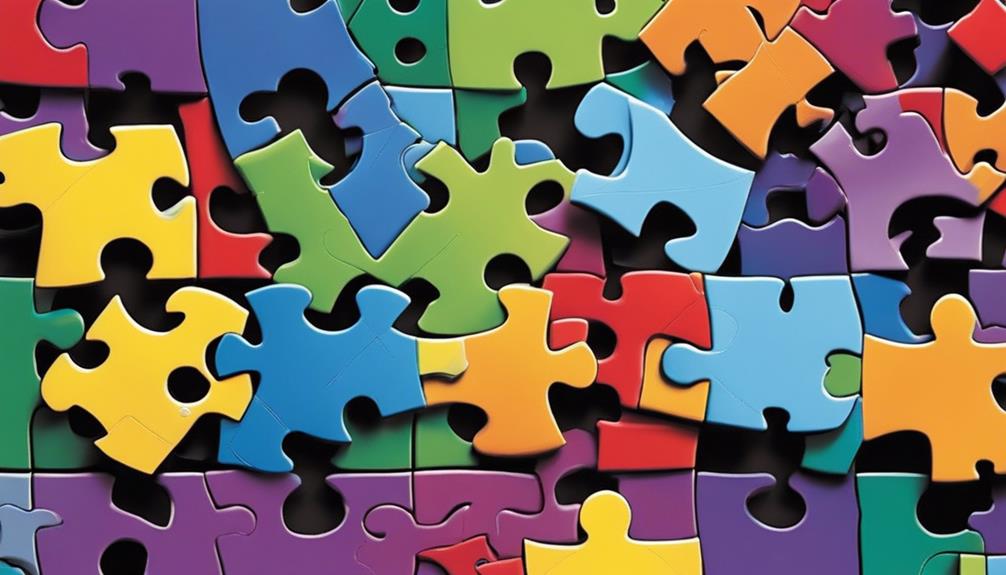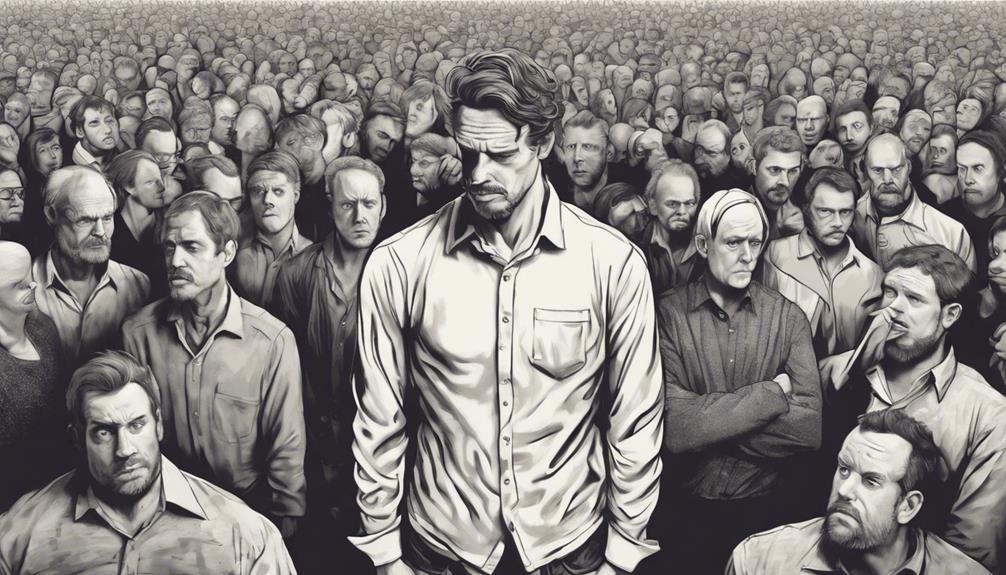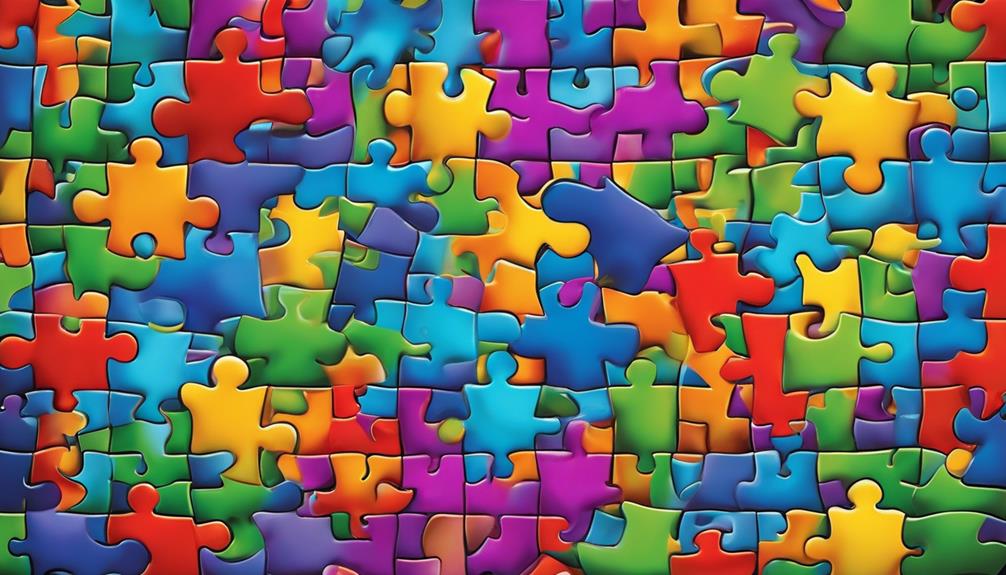During our interactions, we have all experienced moments where it appears someone has an aversion to us for no obvious reason. It’s akin to attempting to piece together a puzzle while lacking key pieces—both bewildering and frustrating.
Perhaps you've experienced a scenario where a person's subtle eye rolls or dismissive attitude left you questioning what you might have done wrong.
In exploring the intricacies of human behavior, we uncover intriguing insights into the complex web of reasons that might underpin such unfounded animosity.
Key Takeaways
- Unconscious triggers and past experiences influence perceptions.
- Lack of clear communication leads to misunderstandings.
- Social dynamics and differing values can cause dislike.
- Self-reflection and empathy can help address negativity.
Unconscious Triggers
Unconscious triggers, often deeply ingrained from past experiences, can influence how individuals perceive and interact with others without conscious awareness. Our behaviors and reactions can be shaped by a myriad of factors, some of which may have roots in unresolved trauma or insecurities.
It's essential to recognize that what someone displays on the surface mightn't always reflect the deeper layers of their being. Past experiences, especially negative ones, can create invisible barriers that affect how we relate to others. These triggers can unknowingly spark discomfort or unease, leading to an unexplained aversion towards certain individuals.
Understanding the complexities of unconscious triggers allows us to approach interpersonal relationships with empathy and compassion. By acknowledging that someone's actions might stem from past wounds or insecurities, we can cultivate a more understanding and supportive environment. It's crucial to navigate these dynamics with sensitivity, recognizing that everyone carries their own unique set of experiences that shape their interactions with the world.
Envy or Jealousy

Envy or jealousy, stemming from feelings of inadequacy or insecurity, can lead individuals to harbor dislike towards you based on perceived success or happiness. When someone is struggling with their own insecurities and shortcomings, seeing your achievements or qualities can trigger jealousy. They may feel envious due to a lack of similar successes, which can result in negative emotions towards you.
It's important to recognize that these feelings of inadequacy or insecurity are often at the root of their dislike. Jealousy can cloud one's perception and lead to misconstrued feelings of animosity. By understanding that their dislike may be rooted in their struggles, we can approach the situation with empathy and compassion.
It's essential to navigate such dynamics delicately, offering support and kindness to help alleviate their feelings of envy and insecurity, potentially fostering a more positive relationship.
Misunderstood Actions
When misunderstandings arise from our actions, they can inadvertently lead to a negative perception from others. Lack of communication or clarity often plays a significant role in these situations. Our intentions mightn't be effectively conveyed, causing misinterpretations that result in undeserved dislike.
Cultural differences can also contribute to confusion, as what's acceptable or normal behavior in one culture may be perceived differently in another. Additionally, unintentional gestures or expressions could be easily misread, leading to unwarranted negative feelings towards us.
Assumptions made about us without proper context or information can further exacerbate this issue, creating baseless dislike. It's essential to recognize these factors and strive for clear communication to avoid being misunderstood.
Taking the time to explain our actions, considering cultural nuances, and being mindful of how our gestures might be perceived can help bridge the gap of misinterpretations. By addressing these misunderstandings proactively, we can potentially change the negative perceptions others may have due to our misunderstood actions.
Social Threat Perception

We often find ourselves in situations where others perceive us as a threat without us intending to cause harm.
Misunderstood body language or unintentional social cues can inadvertently trigger feelings of intimidation in others.
Past negative experiences could also play a role in how we're perceived, causing individuals to react defensively towards us.
Misunderstood Body Language
Misinterpreted body language can often lead to a perception of social threat, potentially causing someone to dislike you without a clear reason. Nonverbal cues like crossed arms or limited eye contact can be misread as defensiveness or unfriendliness, even though that mightn't be the intention.
Moreover, different cultural backgrounds play a significant role in how body language is understood, adding to potential miscommunication. It's crucial to be aware of our own body language, as unintentional signals of discomfort or disinterest can inadvertently push others away.
Unintentional Social Cues
Unintentional social cues, whether through body language, tone of voice, or facial expressions, can inadvertently trigger feelings of threat or insecurity in others. Sometimes, our non-verbal signals are misinterpreted, leading to misunderstandings and discomfort in social interactions.
It's crucial to be mindful of how we convey ourselves, as subtle cues can have a significant impact on how we're perceived. By being aware of our body language, tone of voice, and facial expressions, we can strive to communicate more effectively and positively.
It's important to remember that what seems natural to us might be interpreted differently by others. Developing an understanding of unintentional social cues can help us navigate social situations with empathy and consideration for others' perceptions.
Past Negative Experiences
Navigating social interactions can be challenging, especially when past negative experiences contribute to a social threat perception that might lead someone to harbor dislike towards you. Traumatic events, unresolved conflicts, or negative associations from the past can deeply influence how individuals perceive and react to your presence.
Previous encounters with similar traits or behaviors in others may trigger unwarranted negativity towards you, even if you aren't the source of their past discomfort. It's essential to approach these situations with understanding and empathy, recognizing that sometimes, dislike towards you may stem from factors beyond your control.
Insecurity Reflection

In instances of insecurity reflection, individuals may project their own self-doubts onto others, leading to unwarranted feelings of dislike without a genuine basis. When someone is struggling with feelings of inadequacy and self-doubt, they might find it easier to direct those negative emotions towards someone else rather than facing their own insecurities. This coping mechanism can result in them displaying unwarranted dislike towards you, even though you may not have done anything to provoke such feelings.
It's important to remember that this unwarranted dislike is a reflection of their internal struggles and not a true representation of who you're as a person. Understanding that their behavior stems from their own insecurities can help you approach the situation with empathy and compassion. By recognizing that their actions are a result of their internal battles, you can navigate the situation with a level of understanding that can help diffuse any tension and foster a more positive interaction.
Unresolved Past Issues

We've all experienced moments where past negative experiences or misunderstandings have colored our perceptions of others. These unresolved issues can fester and influence how we interact with someone, even if the initial problem is long gone.
It's important to acknowledge and address these past hurts to prevent them from tainting present relationships.
Past Negative Experiences
Understanding how unresolved past negative experiences can shape one's perception of another is crucial in unraveling the complexities of interpersonal relationships.
Past traumatic events or conflicts can significantly impact how someone views you, leading to unfounded dislike. Negative memories from previous interactions may resurface, clouding their current feelings and causing them to hold onto negative emotions.
It's essential to recognize that these unresolved issues or conflicts from the past might be influencing their attitude towards you, even if you aren't directly involved in the initial negative experiences. By acknowledging and empathizing with their past negative experiences, we can begin to address the root causes of their feelings and work towards building a stronger connection.
Misunderstandings or Assumptions
Unresolved past misunderstandings or assumptions can significantly influence someone's perception of you, potentially leading to unwarranted dislike. Past conflicts or misunderstandings, if left unresolved, may create a negative perception that colors how others see you.
Assumptions made about your behavior or intentions, without clear communication, can further contribute to this baseless aversion. It's possible that past experiences with similar traits or actions in others have triggered negative feelings towards you, even though you aren't at fault.
Lack of communication or clarification about past incidents can easily lead to misconceptions and unwarranted dislike. Addressing these misunderstandings and assumptions with open communication and empathy can help bridge the gap and foster better relationships.
Lack of Relatability

Feeling disconnected from others due to differences in interests or communication styles can often lead to misunderstandings and a sense of not being liked. When relatability is lacking, it can be challenging to establish meaningful connections with those around us.
Here are some reasons why this might happen:
- Differences in Interests: Varying hobbies or passions can create a barrier to finding common ground.
- Values Misalignment: Misunderstandings stemming from conflicting core beliefs can hinder relationship development.
- Communication Style Variations: Varied ways of expressing oneself may lead to misinterpretations and a sense of disconnect.
Navigating these differences requires empathy, active listening, and a willingness to explore shared interests. By actively seeking common ground and understanding where others are coming from, we can work towards building stronger and more harmonious relationships.
Personality Clash

When personalities clash, it can lead to conflicts stemming from differing values, beliefs, or communication styles. These clashes may arise due to introversion versus extroversion, where one person might prefer solitude while the other thrives in social settings.
Conflicting values and beliefs can also play a significant role in creating tension between individuals. For instance, if one person values honesty above all else and another prioritizes diplomacy, it can lead to misunderstandings and potential dislike.
Communication styles are another key factor in personality clashes. Some individuals may prefer direct and straightforward communication, while others might lean towards a more nuanced and indirect approach. These differing styles can result in misinterpretations and frustration, contributing to a lack of rapport between people.
In essence, when conflicting values, communication styles, and personality traits come into play, it can create a challenging dynamic that leads to dislike or discord between individuals. Understanding these differences and finding common ground can help mitigate the effects of personality clashes and foster better relationships.
Unconscious Bias

Understanding unconscious bias is crucial for navigating interpersonal relationships effectively and fostering inclusivity. Unconscious bias refers to prejudices and stereotypes that influence our judgments and behaviors without our awareness.
Here are three key points to consider when exploring unconscious bias:
- Prejudices and Stereotypes: Unconscious bias can manifest through ingrained prejudices and stereotypes, shaping our perceptions of others based on factors like race, gender, or physical appearance.
- Unfair Treatment: Unconscious bias may result in unfair treatment, where individuals are judged or treated differently due to hidden biases that impact decision-making processes.
- Societal Norms and Personal Experiences: Our unconscious biases are often influenced by societal norms and personal experiences, highlighting the importance of self-reflection and awareness in understanding and addressing these biases.
Misperceived Intentions

We've all been in situations where our actions were misinterpreted, leading to misunderstandings and hurt feelings.
Sometimes, a lack of clear communication can make it easy for others to assume the worst about our intentions.
It's important to address these misperceptions early on to prevent unnecessary conflicts and build better relationships.
Unintentional Actions Misinterpreted
Sometimes, unintentional actions can be misunderstood, causing perceptions of our intentions to be skewed. It's crucial to recognize that what we do mightn't always align with how others interpret our behavior. Here are some key points to consider:
- Unintentional Impact: Our actions may inadvertently convey a message we didn't intend, leading to misunderstandings.
- Assumptions vs. Reality: Despite our genuine intentions, others may misinterpret our actions based on their own biases or past experiences.
- Clarification Matters: Lack of communication leaves room for misperceptions to take root, potentially fostering negative views of us.
Being aware of how our actions might be misconstrued can help us navigate interactions more effectively and prevent unnecessary conflicts.
Lack of Clear Communication
Miscommunication often leads to misunderstandings and misinterpretations of intentions, fostering unnecessary tension and negativity in relationships. When communication lacks clarity, non-verbal cues and assumptions come into play, leading to misperceptions of one's motives.
Without direct communication, it's easy for others to misinterpret actions, leading to unwarranted dislike. Assumptions about feelings or intentions can cloud judgment, causing unnecessary rifts. By ensuring clear and open communication, intentions can be understood, and misunderstandings prevented.
It's crucial to address any communication gaps promptly to avoid negative perceptions. Clear communication not only clarifies intentions but also fosters better understanding and harmony in relationships.
Frequently Asked Questions
Why Would a Person Not Like You for No Reason?
Sometimes, people may not like us for no apparent reason, leaving us puzzled. It's essential to approach this with understanding and empathy, recognizing that everyone has their own unique experiences and perceptions influencing their feelings.
What to Do if Someone Dislikes You for No Reason?
If someone dislikes us for no reason, we focus on fostering positive connections with those who appreciate us. We prioritize our mental well-being, practice empathy, and invest in personal growth. Our value isn't determined by everyone's approval.
What to Do When Someone Just Doesn T Like You?
When someone just doesn't like us, we focus on being kind, understanding, and genuine. We reach out with empathy, seeking to build bridges. Remember, not everyone will vibe with us, but staying true to ourselves is key.
How to Be Ok With Being Disliked?
We accept that not everyone likes us, and that's fine. We focus on positive relationships that bring joy. Prioritizing connections that appreciate us is key. Coping with dislike involves valuing supportive relationships and embracing diverse opinions.
Is My Ex’s Behavior a Sign of Dislike or Just a Lack of Communication?
Trying to decipher your ex’s behavior can be a challenge. Often, their actions can leave you wondering about their ex’s unblock intentions revealed. It might not necessarily indicate dislike, but rather a lack of clear communication. It’s important to have an open and honest conversation to gain clarity.
Conclusion
As we navigate the complex web of human interactions, it's important to remember that not everyone will like us for reasons beyond our control. Like ships passing in the night, we may never fully understand the currents that drive someone's feelings towards us.
But just as the moon waxes and wanes, we must embrace the ebb and flow of relationships, knowing that our worth isn't defined by the opinions of others. Embrace your uniqueness, shine bright, and let the tides of life carry you forward.









